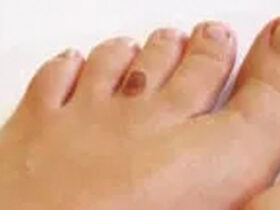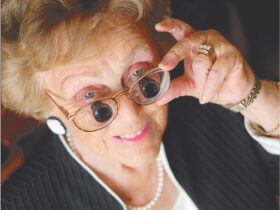With outdoor sporting activities like golf, tennis, fishing and swimming offered year-round, Southwest Florida offers countless opportunities to stay active. With this privilege also comes the responsibility of protecting ourselves from sports-related eye injuries.
April is Sports Eye Safety Month, serving as a timely reminder to protect our eyes while playing sports. Activities with balls, rackets or flying objects pose a potential for eye injury, including a scratched cornea, blunt eye trauma, penetration, chemical burns and swelling.
Emergency rooms in the U.S. treat sports-related eye injuries every 13 minutes, most of them preventable. Whether you’re a professional or recreational athlete, precautionary measures can help protect your eyes from injury.
Wear protective eyewear.
Regular eyeglasses, sunglasses and contacts will not prevent sports-related eye injuries and can make an injury worse if they shatter. Safety goggles or glasses with polycarbonate lenses should be worn for racquet sports, basketball and golf, as well as batting helmets with polycarbonate face shields for baseball. Polycarbonate lenses and shields are thinner and lighter than plastic, are shatter-proof and provide 100% UV protection. Look for protective eyewear labeled ASTM F803 approved, as it is performance tested to give the highest levels of protection.
For fishermen, eye injuries make up over 9% of fishing-related injuries seen by doctors, mostly from hooks, sinkers and lures. Wrap-around polarized sunglasses protect the eyes, decrease eye fatigue and UV exposure with the bonus of increasing the ability to see fish in the water.
Eye injuries from water sports can include eye infections and irritations, and scratches or trauma from other swimmers. In the pool or in natural waterbodies, the easiest way to protect your eyes is keeping the water out with water-tight goggles.
Limit sun exposure.
Sunlight accelerates the aging of delicate eye tissue, so athletes – even on a cloudy day – should take measures to protect the eye from sun exposure.
Sunglasses protect your eyes from the sun’s ultraviolet rays and help reduce eye strain and squinting. Look for durable sports frames with prescription or non-prescription lenses that block out 99% of both UVA and UVB radiation.
Sports sunglasses can also help protect your eye from blunt injury as well as wind, dust and other debris. They can even help improve sports performance with tints to reduce sun glare or light-filtering capabilities that make it easier to see certain colors such as yellow tennis balls.
See your ophthalmologist.
Visiting an eye specialist on a regular basis is important for the overall eye health of any individual, and especially so if you are participating in activities that may pose a risk to your eyes. Eye exams allow ophthalmologists and optometrists to monitor, detect and treat developing eye conditions before vision loss occurs. If you are an avid athlete or are considering taking on a new sport, speak to your ophthalmologist to determine which eyewear products are best for you.
Seeing an eye doctor following an injury, even if it seems minor, can help preserve or restore the health of your eyes.
In addition to direct eye injuries, a severe blow to the head can result in visual problems affecting 20 different visual skills, so an eye examination is also recommended following a head injury.
If a serious eye injury occurs:
• Seek medical attention right away.
• Do not rub your eyes. Pressure can do more harm than good when it comes to eye injuries.
• If your eye has been in contact with chemicals, immediately flush the eye with water.
• For blunt injury to the eye, gently apply cold compresses without pressure.
• For cuts and punctures to the eye, do not rinse or apply pressure. Instead, shield the eye by covering with a paper cup or something similar that will not contact the eye. Gently tape it there for a temporary eye patch.
• Never, ever attempt to remove an object stuck in the eye.
Safety equipment is made for protecting your body, and eyewear is no exception. Schedule an appointment to learn how you can take a more proactive approach to your eye health. Your eyes will thank you!
If you have concerns about your vision, it is important to speak to a doctor to discuss treatment options. With more than 25 years of service to the Southwest Florida community, Elmquist Eye Group offers experienced doctors who are dedicated to patient care. Dr. E. Trevor Elmquist, Dr. Kate Wagner, Dr. Sarah Eccles-Brown and Dr. Nina Burt of Elmquist Eye Group are available to answer your questions. With three U.S. military veterans leading the practice, rest assured knowing that Elmquist Eye Group’s team stands ready to serve you with knowledge and experience right here in Southwest Florida.
For more information, visit www.Elmquist.com, call 239-936-2020 or stop by an Optical Boutique location in Fort Myers or Cape Coral.
Optical Boutique location in Fort Myers or Cape Coral
239-936-2020
www.elmquist.com
FORT MYERS
7970 Summerlin Lakes Dr.
CAPE CORAL
2336 Surfside Blvd., Suite 121









